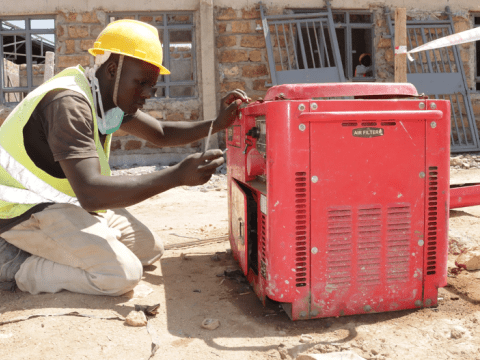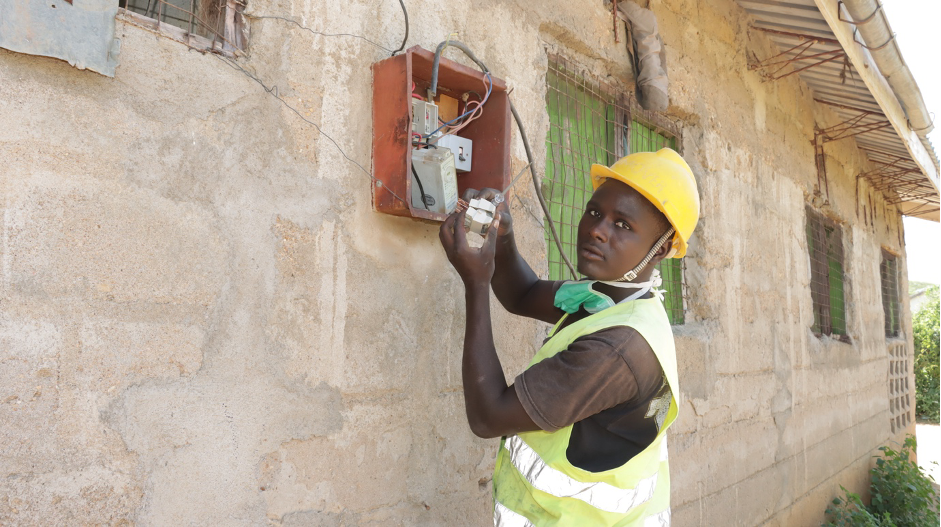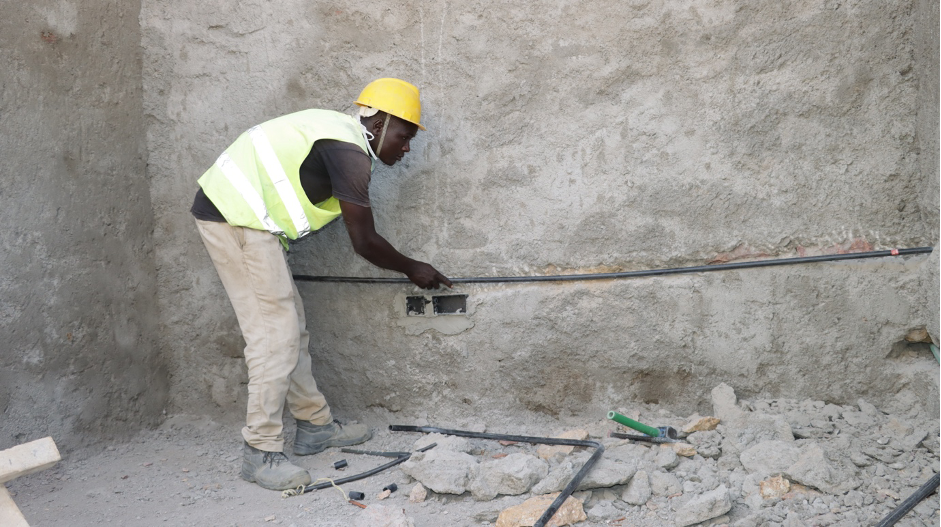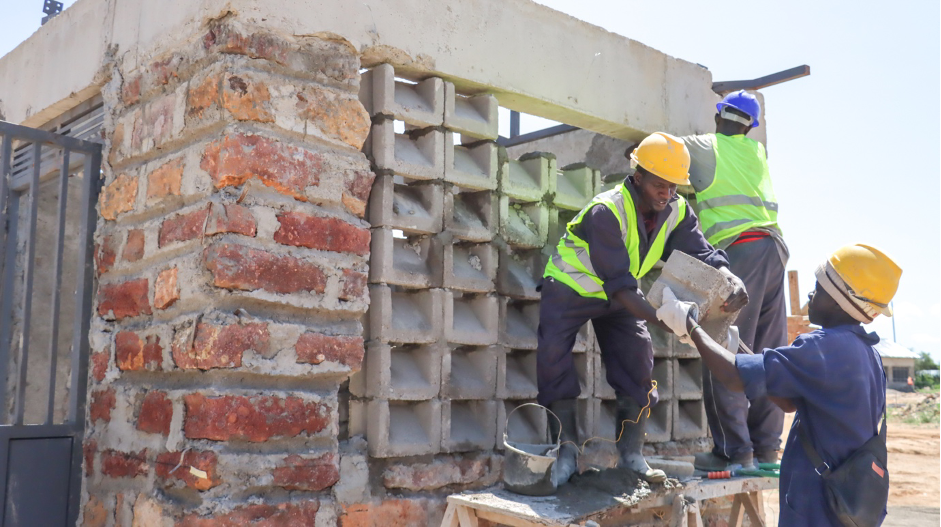‘Ujuzi Vijijini’ Initiative Unlocking Opportunities for Vulnerable Youth in Turkana

Pastoral communities in Northern Kenya traditionally derived their livelihoods from natural resources such as livestock, pasture, vegetation, and water. However, persistent droughts, overgrazing, and other climate change-related phenomena have led to the depletion of these resources, resulting in conflict, displacement, and disasters.
With no means of sustaining their livelihoods and no investments for the future, the right to education for children and youth has been stifled. This is the sad reality for many marginalized youths in Northern Kenya, who end up missing out on education, leaving them unemployable and with limited opportunities in life.
This situation has compelled young people to embrace education as a key to success and a form of empowerment that helps reduce harmful cultural practices like cattle rustling, promoting peace and stability in the region. Joseph Ethekon, a World Vision staff, says, “Cattle rustling activities and banditry attacks force children and families to flee their homes, leaving schools closed as parents fear for the lives of their children. Consequently, these communities become more vulnerable, with no one possessing the much-needed skills to transform their communities.”
World Vision’s Integrated Management of Natural Resources for Resilience in Arid and Semi-Arid Lands (IMARA) Programme funded by the Government of Sweden, began offering vocational skills training dubbed “Ujuzi Vijijini” to young people from Elgeyo Marakwet, Turkana, and West Pokot counties. Youth selected from these communities were enrolled in various Technical Vocational Education and Training (TVET) institutes to economically empower them by building their technical skills, informed by market needs to enhance their livelihoods.
Under the Ujuzi Vijijini training initiative, World Vision partnered with the Government of Kenya to support 544 (207 female and 337 male) vulnerable youth from Baringo, Elgeyo Marakwet, Turkana, and West Pokot Counties to be trained in various courses such as beauty therapy, catering and accommodation, electrical and solar installations, hairdressing, masonry, mobile phone mechanics, motorcycle mechanics, plumbing, tailoring and dressmaking, and welding. The programme has also supported these graduates with basic start-up kits, equipping them to venture into self-employment in sectors that protect natural resources.
“We believe that by equipping these youth with technical and vocational training, we are empowering them create opportunities for diversified livelihoods. This makes them self-reliant and more resilient, driving change and protecting natural resources in their communities.” Says Joseph Ethekon.
Here are the stories of some of the empowered youth:
Joshua Lomuria
Twenty-four-year-old Joshua Lomuria comes from a family of five, living in Kainuk, in Turkana County. His educational journey had only reached the secondary school level, as he could not progress further due to a lack of funds. Joshua learned under difficult circumstances, as instability from cattle rustling activities often disrupted his schooling. Bandits frequently raided their home, stealing livestock, which was the only source of income for their family.
“I did not perform well in school because of insecurity, and lack of school fees, which made me miss school for some time. After secondary school, life became miserable, and I contemplated suicide until a friend encouraged me to stay positive, and that despite performing poorly in my national examinations, I still had value in life.”
Joshua’s dream of going to college seemed impossible. He sought employment as a boda boda rider [motorist], earning Ksh. 150 daily, until he heard of the vocational training program supported by World Vision. This was when he saw an opportunity to realize his potential and earn a living to support his family. Joshua always dreamed of working as an Electrical Engineer at The Kenya Power and Lighting Company, which owns and operates most of the electricity transmission and distribution systems in the country.
He shares, “One morning, while on my routine duty of riding a motorbike, a village elder stopped me and asked if I had heard about the Ujuzi Vijijini initiative offered by World Vision. I felt it was God using him [village elder] to connect me to my destiny!”

Joshua applied for the programme and was among the youth to be shortlisted to pursue a vocational course at Lodwar Technical and Vocational College. He pursued a six-month Electrical Engineering vocational training course, and later secured an industrial attachment opportunity at Lodwar Referral Hospital. “The attachment exposed me to intensive practical work. I learned how to repair sophisticated electrical equipment like fridges. Today, I can repair fridges, air conditioner (AC) and fan coil units, autoclaves among other equipment.”
After completing his industrial attachment, Joshua secured full-time employment as an electrician with a company constructing a modern hospital in his community, earning over Ksh. 35,000 monthly. "World Vision has given me new hope through skills training, knowledge, and values useful in life. I used to think I was a failure, but today I have discovered my worth."

Joshua’s skills have attracted many customers who engage him for part-time services whenever he is not at work. His hard work and determination have also earned him respect and a sense of admiration among his peers. He has started equipping his electrical shop and hopes to create employment opportunities for young people in his community.
Samuel Lokutano
When 25-year-old Samuel Lokutano finished high school in 2016, he hoped to enroll in a Vocational Training College to pursue a course leading to employment so he could support his family.
Despite passing his national examinations, education became a dream for him. His efforts to proceed with college education remained futile, especially due to cattle rustling activities that robbed his family of income. “I unsuccessfully hopped from one college to another, enrolling in different institutions with the hope of securing a scholarship to pursue a course. This remained a distant dream.”
Samuel, like Joshua, experienced financial hurdles after completing his secondary education. “When bandits launch an attack, they take away livestock, leaving families poorer and without any other source of livelihood. Parents can no longer afford school fees for their children.” He tried his hand at farming and casual jobs, earning Ksh. 200 daily whenever work was available, but this was unsustainable.
In March 2023, Samuel heard about the vocational training program from a World Vision community volunteer in Kainuk and was lucky to be enrolled in Lodwar Vocational College, where he trained in Masonry.
“Besides the training in Masonry, World Vision also took us for Empowered World View and Business Plan Development training workshops and gave us start-up kits upon completion of our certificate courses.”

Samuel has since secured full-time contractual employment as a mason with a company constructing a modern hospital in his community, earning over Ksh. 35,000 monthly. He happily says, “I can now comfortably support my family, and pay school fees for my young siblings. With this salary, I have also opened a boutique shop where my wife works to diversify our sources of family income.” He adds, “These trainings changed my perception and challenged me to become a job creator instead of relying on formal employment.”
He is currently saving part of his salary and wishes to further his studies by enrolling in a leading Technical Institute to pursue a Building and Technology course. “I need additional skills to enable me to register a consultancy company specialising in welding, carpentry, and masonry, where I can provide mentorship and create employment opportunities for vulnerable youth in my community.”
By Felix Pilipili, Communications Specialist, World Vision Kenya